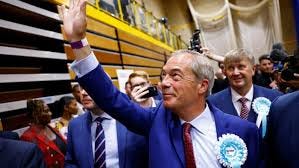A few quick observations on last night’s UK election.
First, there seems to be a broader pattern across western Europe in which the populist right surged during 2014-16, the centre-right (and some centre-left parties in Denmark and to a degree Norway) then co-opted the message of the populist right. Some thought making anti-immigration noise was enough to placate their voters. Think of the Tory Boris Johnson drawing voters from the Brexit Party, VVD’s Mark Rutte in the Netherlands winning Geert Wilders’ voters over with comments like telling Muslim immigrants to ‘act normal or go home’ and Emmanuel Macron promising to get tough on immigration. In Austria, Sebastian Kurz of the centre-right OVP lured over many Freedom Party voters.
What then happened was that in some countries, notably the Netherlands, France and Britain, the populist right presided over rising immigration, hoping they could talk one way and act another. The result has been revenge from populist voters, kicking the centre-right while boosting the populism of Wilders, Bardella and Farage. This is the most recent wave in the cycle of a national populism which is rising over the long-run because of growing ethnic diversity (also the point I made in Whiteshift).
We’ll have to see if the centre-right’s next populist shift (Kemi in Britain?) is more convincing and enduring, or whether trust has been lost with restrictionist voters.
A second pattern I may write more about is the hollowing out of the political centre toward either the woke left or populist right. Old party loyalties, rooted in communities, are in decay and expressive voting and floating are on the rise. I see parallels with religion, where people have gravitated to either strong religion (like evangelicalism or Orthodox Judaism) or secularism as liberal religion collapses. You see these patterns most clearly among younger generations. For example, young people on the right are voting RN rather then Republicain or for Macron in France; for Reform not the Tories in Britain; and so forth. I wrote about this in more depth in my recent Unherd piece on why young people are polarizing toward woke and populism.
The final thing to watch in Britain is the emerging split on both left and right. For the Tories, the leadership contest will expose the factional fight between liberal and nationalist Tories. For Labour, issues such as Gaza, austerity and whatever migrant deterrence policy replaces the Rwanda Plan will raise hackles on the backbenches and among woke party activists. Since Labour’s younger cadres, like those of the Democrats, are motivated by cultural left-liberalism, they will not be content to watch Starmer appease his Red Wall voters on culture and migration. The fact Labour’s vote share is lower than Corbyn’s in 2017 could furnish the basis of the restive left’s attempt to delegitimise the centrism of Starmer. Watch this space as technocratic neoliberal centrists in both parties come under attack.





Good summary of where we are. Difference now is that Tories need to act as well as sound tough to keep Farage on board, Reform are too big and too distinct to be ignored. But we shall see.
I have now read several articles saying pretty much the same thing. I'd like to know if these articles all came to the same conclusion independently or whether there's an echochamber which is hard, even for clever, knowledgeable writers, to resist. I would like to think they are all thinking independently and in Eric's case, I'm sure he is.